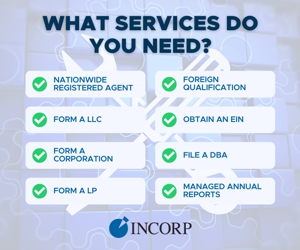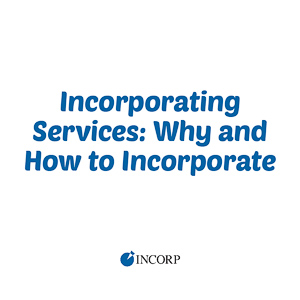Incorporating Services: Why and How to Incorporate
Operating a business as a corporation has many advantages, and can be easier and less expensive than you might think. If you're considering starting a business, or if you're currently operating as a sole proprietor or a partnership, consider some of the benefits of forming a corporation, and decide which services you might need for your new corporate entity.
Why Should I Incorporate?
The main reason business owners incorporate is to separate their personal assets from their business assets, to protect themselves in case of a lawsuit or other liability, a dissatisfied customer, a workplace accident, an employee who believes they were wrongfully terminated. The reasons for litigation are practically endless. If the court issues a large judgment against your unincorporated company, the person suing you may take all of the company's assets and then go after whatever else you own, including your bank accounts and your personal property. If you have formed a corporation, your personal liability is limited to the extent of your actual investment in the company; your personal assets are protected. Think of it as another form of insurance, and one well worth the investment.
Forming a corporation can also have tax advantages in certain situations:
- A corporation can provide corporate retirement and medical plans for its officers.
- Sole proprietors are responsible for self-employment taxes, while corporations are not.
- Unincorporated companies are limited in the amount of losses they can carry over from year to year, while corporations are not.
- Forming a C corporation may give you greater tax flexibility. For example, if your sole proprietorship earns $150,000 in a year, you would be in a higher personal tax bracket than if you drew $75,000 as salary from the corporation and left the other $75,000 as corporate profit.
- As with any tax situation, be sure to consult your tax advisor before making any decisions.
There are many other advantages to incorporating. For example, operating as a corporation gives you more credibility in dealing with other businesses, including banks and vendors. And if you're concerned about personal privacy, your identity can be shielded by using a corporation, since only the registered agent's name is public record, not the individual shareholders'.
-
Should I Do My Incorporation By Myself?
Many online companies offer do-it-yourself incorporation kits, or you can go to the Secretary of State in your state and fill out the paperwork yourself. However, this is one situation where it may be better to turn it over to a professional. Like writing your own will, pitfalls you hadn’t considered may end up costing you money in the long run. Since each company’s situation is different, you’ll need to decide which type of entity will work best for you: LLC, C or S Corp, or something else, and a professional can help you make that important decision. Once your corporation is formed, paperwork needs to be filled out annually for it to remain in good standing, and that’s something you don’t want to forget in the rush of conducting your day-to-day business. A registered agent can help you there, allowing you to concentrate on what you do best -- running your business!
-
What Incorporation Services Do I Need?
Here are the principal types of services you may need for your corporation:
-
Registered Agent
Each corporation is required to have a registered agent to accept legal documents and notifications from the state on behalf of the company. The registered agent must have a physical street address within the state and must be available during regular business hours. The registered agent's duties include notifying you when annual reports are due and keeping track of other paperwork you may periodically have to file with the state. It's especially important to have a registered agent if you're doing business in another state, but don't have a physical address there.
-
Certificate of Good Standing
This certificate, also called a "Certificate of Existence" or a "Certificate of Authorization," verifies that your corporation is current with the filing requirements of your jurisdiction's secretary of state, and is also current with franchise taxes (if any) that may be assessed. Generally, you'll need a Certificate of Good Standing when opening a bank account for your business, when attempting to obtain credit for your corporation, or to prove in court that your business is in good standing with the state. If you're doing business in another state, you'll need it to prove that you're registered in your home state.
-
Foreign Qualifications
Any company conducting business in another state is legally required to notify that state and to request permission to maintain legal status there. You'll also need to make sure that that state recognizes your corporation as an entity separate from you as an individual. Otherwise, the measures taken to protect your personal assets may not apply in that jurisdiction. Since paperwork and requirements differ from state to state, an incorporation firm with offices in all 50 states can be a valuable ally in helping you remain legal wherever you do business.
-
Ending Your Corporation
When it's time to shut down your business entity, , it’s important to follow all the necessary legal steps and tie up all loose ends. You may be liable for taxes, fines, and penalties unless you file the appropriate paperwork with the state(s) where you operate.
Starting Your Incorporation on the Right Foot
Setting up your corporation the right way and making sure all the paperwork is done correctly is an investment in your future success. You need to hire experts when you're starting out: a good attorney, a CPA and tax preparer, an insurance agent, a business banker. Be sure to add an incorporation expert to the list to provide a solid foundation for your business.
Stay in the know!
Join our newsletter for special offers.

 Here are the principal types of services you may need for your corporation:
Here are the principal types of services you may need for your corporation:
